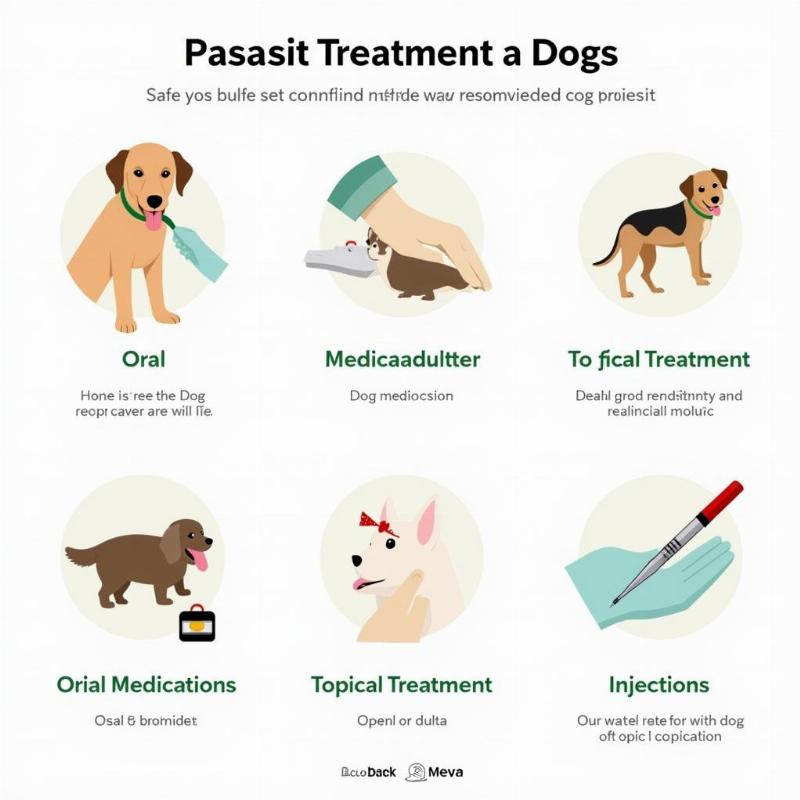Parasites in dogs are a common concern for pet owners across the US. Knowing how to identify the signs of these unwelcome guests is crucial for your dog’s health and well-being. This article will guide you through the common symptoms, types of parasites, diagnostic methods, and treatment options available in the US, helping you determine if your furry friend needs veterinary attention.
Recognizing the Telltale Signs of Parasites in Your Dog
While some parasites are visible to the naked eye, others require a closer look. Here are some common signs your dog might have parasites:
- Skin Issues: Excessive scratching, biting, licking, or chewing at the skin. Redness, inflammation, hair loss, and hot spots can also be indicators.
- Digestive Problems: Vomiting, diarrhea (sometimes with blood or mucus), loss of appetite, and weight loss.
- Respiratory Issues: Coughing, sneezing, wheezing, and difficulty breathing. These symptoms can be especially concerning for puppies.
- Lethargy and Weakness: If your usually energetic pup is suddenly tired and uninterested in playing, it could be a sign of parasitic infection.
- Changes in Coat and Skin: Dull, dry coat, excessive shedding, and dandruff.
- Visible Parasites: Seeing fleas, ticks, or worms in your dog’s fur or stool.
- Scooting or Dragging Rear End: This behavior often indicates tapeworms or other intestinal parasites.
If your dog exhibits any of these symptoms, it’s essential to consult a veterinarian for proper diagnosis and treatment.
Common Types of Dog Parasites in the US
Several types of parasites can affect dogs in the US. Understanding the common culprits can help you take preventative measures and identify potential infections:
- Fleas and Ticks: These external parasites are easily transmitted through contact with other animals or the environment. They can cause skin irritation, allergic reactions, and transmit diseases like Lyme disease.
- Intestinal Worms: Roundworms, tapeworms, hookworms, and whipworms are common intestinal parasites that can cause digestive issues, malnutrition, and even life-threatening complications.
- Heartworms: Transmitted by mosquitoes, heartworms can severely damage a dog’s heart and lungs. Regular preventative medication is crucial, especially in mosquito-prone areas.
- Mites: Microscopic mites can cause mange, a skin condition characterized by intense itching, hair loss, and skin lesions.
- Protozoa: Single-celled organisms like Giardia and Coccidia can cause diarrhea and other digestive problems.
Diagnosing Dog Parasites: What to Expect at the Vet
Your veterinarian will perform a thorough examination and may recommend several diagnostic tests to identify the specific parasite affecting your dog:
- Fecal Examination: Analyzing a stool sample can detect the presence of intestinal parasite eggs.
- Blood Tests: Used to diagnose heartworm disease and other parasitic infections.
- Skin Scraping: Used to diagnose mange and other skin parasite infestations.
Treatment Options for Dog Parasites
 Điều trị ký sinh trùng cho chó bằng thuốc
Điều trị ký sinh trùng cho chó bằng thuốc
Treatment for dog parasites varies depending on the type of parasite and the severity of the infection. Your veterinarian will prescribe the most appropriate treatment, which may include:
- Oral Medications: Dewormers, anti-parasitics, and antibiotics.
- Topical Treatments: Spot-on treatments, shampoos, and dips for fleas and ticks.
- Injections: For heartworm treatment and certain other parasitic infections.
Frequently Asked Questions (FAQ)
- How often should I deworm my dog? It’s generally recommended to deworm puppies every 2-3 weeks until they are 12 weeks old, then monthly until they are six months old. Adult dogs should be dewormed at least twice a year.
- What is the best way to prevent fleas and ticks on my dog? Regularly using preventative medications like flea and tick collars, spot-on treatments, or oral medications is the most effective way to prevent infestations.
- Can humans get parasites from dogs? Yes, some dog parasites can be transmitted to humans, so it’s crucial to practice good hygiene and follow your veterinarian’s recommendations for parasite prevention.
- How expensive is parasite treatment for dogs? The cost of treatment varies depending on the type of parasite, the severity of the infection, and the specific treatments required.
- Are there any home remedies for dog parasites? While some home remedies may offer temporary relief, it’s always best to consult a veterinarian for proper diagnosis and treatment. Home remedies may not be effective and could potentially harm your pet.
- What are the signs of heartworm disease in dogs? Early signs of heartworm disease can be subtle, including coughing, fatigue, and reduced appetite. As the disease progresses, more severe symptoms like difficulty breathing, fluid buildup in the abdomen, and heart failure can occur.
- How often should I test my dog for heartworms? Annual heartworm testing is recommended for all dogs, even those on preventative medication.
Related Articles on Beautdogs.us
- natural flea and tick collar for dogs
- safeguard equine dewormer for dogs
- what to give a dog for dry skin
Beautdogs.us: Your Trusted Source for Dog Care
Beautdogs.us is a leading dog lifestyle website in the US, providing expert advice on dog breeds, care, and products. We offer comprehensive and engaging content for both new and experienced dog owners, covering everything from health and nutrition to training and grooming. Contact us today for all your dog-related needs! Email: [email protected], Phone: +1 501-555-7529. Visit Beautdogs.us for more information.